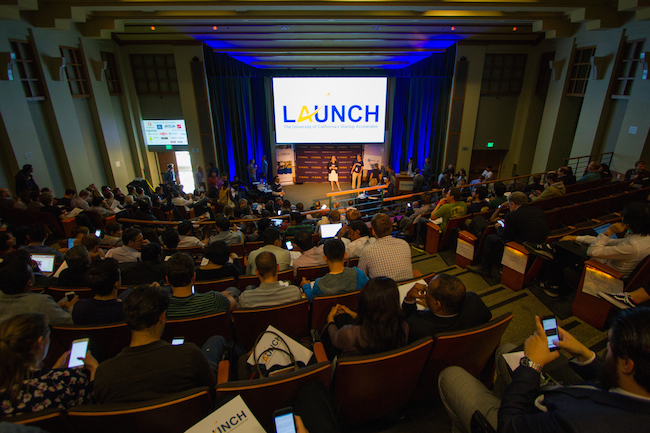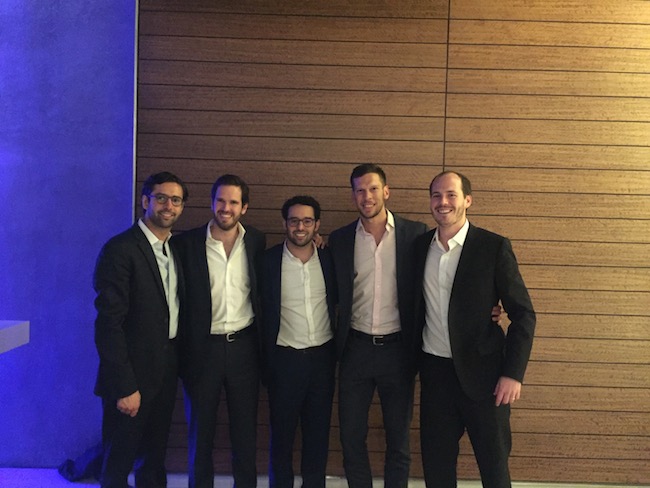
LAUNCH Demo Day. Courtesy photo
LAUNCH, a three-month startup accelerator run by the University of California-Berkeley Haas School of Business, culminated its third year last week with 19 startup pitches before a panel of judges. On Demo Day (April 27), the startups competed to win the grand prize of $25,000 — and catch the eye of investors.
LAUNCH is an accelerator strictly for startups in the UC system. To enter, at least one founder must be a current student, faculty, staff, or alumnus of one of the nine UC campuses. Chosen teams are paired with serial-entrepreneur mentors and attend rigorous “bootcamp” sessions.
And it’s all about getting noticed. “There are judges, but there’s also an audience of thousands of people, and there are investors out there,” LAUNCH co-chair Rob Moore told founders during their last bootcamp.
This year’s teams covered a range of topics, from affordable healthcare to agriculture to pearl milk tea, all of which were founded by entrepreneurs hoping for strong funding followed by quick growth. “Our main goal was to build up our business in the U.S.,” says Leon Rodriguez, a current Haas MBA and co-founder of NecesitoDoc, a Mexico-based healthcare startup participating in LAUNCH this year. “With LAUNCH we’ve learned a lot, and networked a lot with entrepreneurs and VCs in the U.S.”
ENTIRELY RUN BY FIRST-YEAR HAAS MBAs
Sarah Yates, co-chair of LAUNCH, came to Haas interested in entrepreneurship, though at the time she didn’t have a startup idea of her own yet. She spent, on average, 10-15 hours a week working on LAUNCH this year, hard work that paid off in a front-row seat supporting entrepreneurs and being inspired by them.
“I thought it would be a way to form relationships at Haas,” Yates says. “The startup ecosystem is diverse and widespread, and coming in as a first year it was hard to understand the ecosystem and opportunities. So this was an opportunity for me to explore it.”
LAUNCH is run entirely by first-year MBAs. Yates herself comes from a startup background. For six years she worked for an East Coast grocery startup called Relay Foods, moving up from driving trucks and delivering orders to becoming the VP of marketing.
“When I started, the company was just 20 people, and when I interviewed the CEO said, ‘It seems like you’re really interested, and this is the only role we have right now, so come and join and get to know the company.’ And a couple months later, there was a social media job opening, and I rose up from there,” Yates says.
GOING THROUGH LAUNCH AND HAAS AT THE SAME TIME

NecesitoDoc. Courtesy photo
Leon Rodriguez is also a Haas MBA; he cofounded NecesitoDoc with his brother Diego Rodriguez. While Leon attends classes at Haas, Diego is in Mexico working on the company full-time, and traveling to the U.S. to attend LAUNCH bootcamps.
“We’ve been following the process very closely from Mexico,” Diego says. “We’ve been having meetings and sessions together, and we’ve been involved in all aspects of LAUNCH, even though we aren’t there.”
NecesitoDoc is a health-tech platform that helps Spanish-only speakers access health resources. The platform connects patients and doctors via video, charging patients only $8 for a consultation. Leon says they are fully operational in Mexico, offering both primary care and video consultations. “We are planning to offer similar prices to U.S. immigrants — mainly undocumented immigrants who have limited access,” he says.
Diego and Leon have been working on the company since January 2016, and they launched in Mexico later that year. Leon says they’re targeting a B2B model, where they sell packages to corporate clients who can then offer the services to their clients. Already, they have a network of 150 doctors using the platform.
By participating in LAUNCH, they hope to find investors who can help them expand their company into the U.S. healthcare market. “In the U.S., undocumented immigrants have very limited options. They are not covered by insurance, and with the current political environment, we don’t know what’s going to happen,” Leon says.











Questions about this article? Email us or leave a comment below.